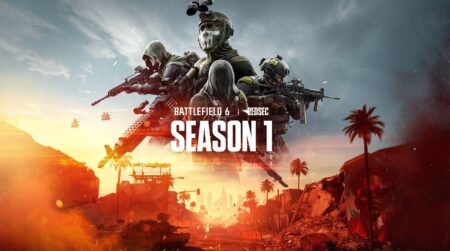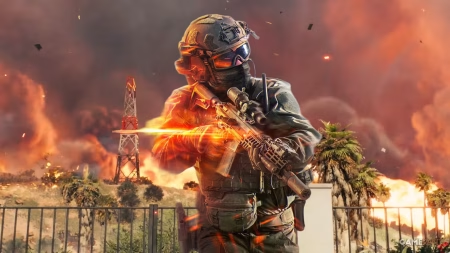Everyone’s heard of the Star Wars Battlefront 2 AMA, and EA pulling microtransactions from the game not long thereafter. There’s been a lot of joy and schadenfreude in that governments across the world have started cracking down on loot boxes, and that EA’s been forced to reevaluate their practices (at least where Star Wars is concerned) because of their latest mishap. “Hit them where it counts!” is the latest mantra, with people pulling their pre-orders as the news spread. Is EA finally going to get karma for all the abusive schemes they’ve been pulling on their customers?
Probably not. While it’s a stretch to say that they’re too big to fail, they’ve positioned themselves in a way that they can recover from the Battlefront II backlash. Here’s some reasons why I think EA isn’t going down any time soon:
Out of the fire, into the frying pan
The recurring theme of EA’s sins has been the microtransactions in next to all of their games. There’s no getting around it. Loot boxes were the buzzword of 2017, but they were a late onset symptom of a greater problem – games that charged for admission, then had DLC and microtransactions afterwards. EA was far from the only company to do this, but it’s debatably the company that started the trend, and while Overwatch is famously credited for bringing loot boxes to prominence, EA and other companies took the ball and ran away with it with increasingly predatory box schemes. (I still contest that the worst boxes of the year were from Shadow of War, since you could lose the contents if you weren’t careful.)

We already expect these mechanics in mobile games and in some free to play games. Some games are free just because they need people for multiplayer. Heck, MOBAs like League of Legends and DOTA 2 are free to play, with some grindable perks and cosmetics available through microtransactions.
The popular argument is that if they have no effect on gameplay, they’re fine. This definitely wasn’t the case for Battlefront II, because even paying to unlock the content didn’t unlock the best possible version of that content – you still need the star cards to level up Vader, for example. Other possible arguments are locking some classes or vehicles behind paywalls, but don’t make them game breaking – games like World of Tanks already do this with some special premium tanks, which aren’t particularly broken, but have different gameplay styles.

All EA needs to do is to just shift to a different pay model – free to play, or low price up front, then add microtransactions and cosmetics for everything. They could lose money up front, but they could just open pre-orders for a deluxe package with perks. It’s moving from a greater to lesser evil, which isn’t less evil, but still not enough to completely kill EA’s profit margin. Even if they decide to go free to play, Anthem is still gaining enough momentum for them to be able to use it to experiment with monetization before they really need to step out of the fire.
The Studio Killer chooses its targets – not wisely, but not risking their golden geese.
EA shut down Visceral recently, likely owing to the fiasco that was Dead Space 3. Widely considered to be a stain on the Dead Space series’ otherwise stellar reputation, the game was poorly designed and the level design felt rushed. To add to that, EA pushed for microtransactions in a game that didn’t need them, which further muddied the franchise.

This wasn’t a huge problem for EA, because Dead Space wasn’t their only IP that they could have made money off of – or murder in cold blood. Mass Effect Andromeda was another victim of EA’s meddling, with poorly-managed development resulting in a game that was rushed near the final stages of development, and shipped largely buggy and without polish. EA didn’t take as much fallout with Mass Effect because the problems weren’t as simple as “microtransactions ruined it”, but with both of these games, the fans were the ones to suffer. EA’s recent acquisition of Respawn may see this happen with Titanfall in the not so distant future.

EA has the rights to way too many games to be able to fail spectacularly as a publisher, and still has FIFA and Madden as dependable cash cows. The company has invested in a lot of relatively conservative choices that have guaranteed cash streams, and while it’s terrifically bad PA when one of their games goes viral for the wrong reasons like with Battlefront, they’ve got enough golden eggs safe to not have to worry about the immediate consequences. Even looking away from consoles and PC, EA’s still got Popcap moving into mobile.
The games even have different audiences – while I’m not suggesting that nobody plays both FIFA and Battlefront 2, someone that may have issues with Battlefront 2 may be more invested in FIFA, and still buy FIFA dependably. Another person could be completely unaffected because they only play The Sims. The only way EA can really mess this up is for them to lock cosmetics behind a paywall for the next Sims game, or for them to hide all of the Madden athletes in loot boxes. (I should probably stop giving them ideas.)

EA might be facing a lot of heat right now, but they’ve got enough stability to stay in power for a while now – while they’re not a paragon of virtue, I also think that we’ve got to have faith in the studios that they’re handling. Anthem will be the next real test of whether EA really has it in them to change for the better, though I’m not particularly hopeful.
[alert type=white ]The views expressed in this article are those of the author and do not necessarily represent the views of, and should not be attributed to Sirus Gaming as a whole.[/alert]






